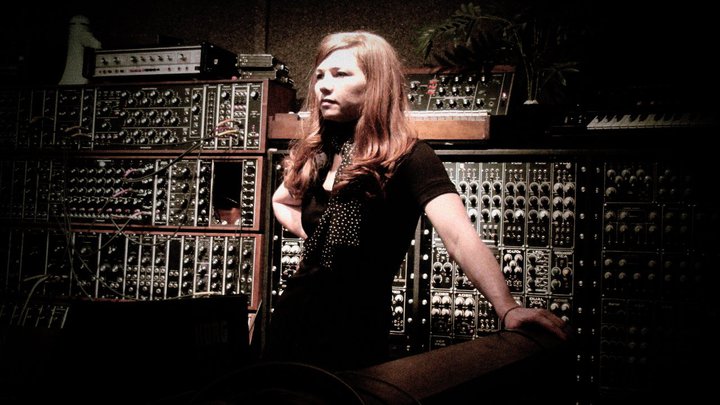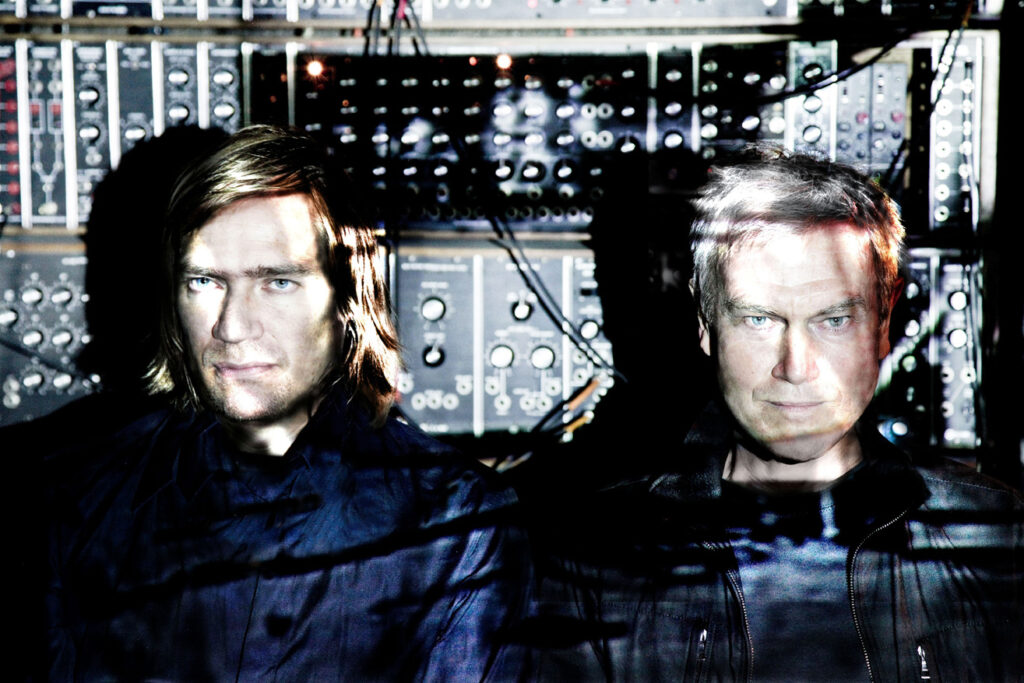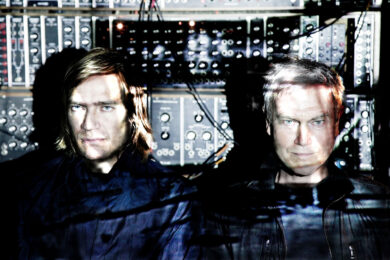The fantastic Mr Foxx is just about to set off on a string of dates across the UK, and to celebrate he has recorded a track for The Quietus with touring partner Tara Busch. John Foxx And The Maths will be playing songs from their new album Interplay, which has been declared by the Quietus, one of the best this year so far. Making up The Maths are his collaborator Benge and the musicians Serafina Steer on keyboards and bass and Hannah Peel on keyboards and violin.
JF and Benge will also be releasing a special album for the tour called The Shape Of Things, which showcases a heavier, more experimental side to their music. The tracklisting for that can be seen at the foot of this news. We’re really honoured to have the John Foxx & The Maths collaboration, and you can listen to ‘Where You End And I Begin’ on our Soundcloud here:
John Foxx And The Maths featuring Tara Busch – ‘Where You End And I Begin’ by theQuietusWe spoke to John Foxx and Tara Busch recently about their differing perspectives on the aesthetics of synth pop…
There is perhaps a general perception of early synth pop and electronic pop music in the UK as being quite sexless but it only takes a cursory glance to see tracks such as The Normal’s ‘Warm Leatherette’, Ultravox!’s ‘My Sex’, Throbbing Gristle’s ‘Persuasion’, Tubeway Army’s ‘My Love Is A Liquid’ and, of course, Soft Cell’s ‘Sex Dwarf’ to see that it was positively torrid compared to punk, post punk, new wave etc. Why do you think this was and why do you think these acts were interested in such extreme/ futuristic/ progressive/ dystopian/ utopian ideas about sex and sexuality?
Tara Busch: People forget how incredibly sexual making music can be – you only have to look at Jimmy Hendrix playing guitar, Jim Morrison singing or Tori Amos playing piano and you can understand that.
Combine that notion with whatever was going on culturally at the time – Blade Runner for example – then combine it with sexy, tactile new machines capable of creating astounding new sounds (sounds that perhaps our bodies respond to in a more sensual way like sub bass, filters, LFOs or a kick drum that feels & sounds like a heartbeat) and it seems perfectly natural to dive head first into whatever is dark, disturbing and beautiful. I can’t speak for the artists you mention, but that’s how it appears to me.
John Foxx: Agreed. Synths are slinky, electro-organic, orgasmatronic plug-ins for humans. With them you can dance, work, sleep ambionically, stimulate yourself and others intellectually, physically, spiritually and sideways.
Electronics have effortlessly absorbed dub bass, metal power, acid psychedelia, trance transcendence, as well as pop’s endearing instant universe creation tendency – they’re all rolled up in this roaming ball of fizzing, ultraviolet protoplasm. It can travel by phone right into your ear. There’s really nothing it won’t feed on, nothing it can’t do. It’s a ruthless little demon – but deeply caring, of course.
I’m currently attempting to direct its attentions toward the banking system. Everyone will get an invite to the party if there’s any traction.
As an aside to all this – I also happen to believe that intellectual activity is erotic. I don’t believe you can truly understand anything without total involvement. This body/ brain/ sensual/ intellectual divide is tosh. We think and understand with our entire being. Anything less is a perversion.
From this angle, don’t synths seem to make the perfect eroto-intellectual tool? You can use a simple drum-machine and keyboard to pattern yourself and others into a fascinating new, shape-shifting, reintegrated, intellectual electro-erotic counterculture.
Learn new transferable skills. Make friends and influence people. Impress your relatives. Always carry fuses.

One of the earliest singles to explore the erotic potential of synthesizers – albeit in a very dark way – was The Normal’s ‘Warm Leatherette’ which was like JG Ballard’s Crash condensed onto one side of a 7”. Again, synth pop embraced themes of dystopian sexuality through literature; Numan via Phillip K Dick, Throbbing Gristle via William Burroughs and Brion Gysin, Cabaret Voltaire via Flannery O’Connor. Just from a personal point of view which works of literature have inspired you to make music – past and present? And why – if it is the case – do these books, poems, essays etc concern themselves with such outsider topics as sexuality, dystopia, violence, drugs etc?
TB: I must admit that literature is not one of my direct influences at the moment – in fact, the only books you’ll find my nose in at the moment are synth manuals & cookbooks!
However, what is a huge influence on me is film. It’s the the narrative combined with the aesthetic of film that wins out over books for me (though no doubt films and books feed into each other). I can say that an obsession with the films The Wizard of Oz, Midnight Cowboy and Sunset Boulevard were a big influences on my first album, as they were all very character-driven stories full of longing and nostalgia.
Currently, as my interest in technology and synthesizers grows, it has not only influenced how I make music, but my personal taste – I have developed a deep love of sci-fi and classic horror like The Omen, The Excorcist, Don’t Look Now, Logan’s Run, The Andromeda Strain, A Clockwork Orange, 2001: A Space Odyssey, Moon and also The Twilight Zone TV series. My work seems to take on themes of space exploration, aviation and escape as well as exploring and excavating the dark, deep rooted consequences of growing up in a religious household. The scores to these films moved me profoundly as well.
The whole human/ versus machine theme is also something I find irresistible – the idea of robots developing emotions & becoming sentient – Like Hal in …Space Odyssey, GERTY in Moon and Proteus IV in Demon Seed… all of which have very sexual and violent undercurrents. I think these films, like the books you mentioned, obviously also deal with sexuality, dystopia of some sort and violence – because it seems to be more of a look at the human condition and how people unravel under extreme circumstances. Transferring that subject matter into music is both confrontational, intense and incredibly satisfying – especially when you have a great synth to express that!
JF: I get lots of ideas for songs from books – especially the titles. And occasionally without even reading the book.
The authors who pulled me into their worlds are mostly pretty obvious – Ballard, Burroughs, a couple of Harlan Ellis short stories, Ginsberg, Ackroyd’s Hawksmoor, Kazuo Ishiguro’s The Unconsoled, many of John Cheever’s short stories, especially The Swimmer, Truman Capote, William Boyd, Michael Chabon, E.L. Doctorow, Paul Auster’s New York Trilogy, Dr Jeckyll and Mr Hyde, Metamorphosis by Kafka, and lately The Arcades Project by Walter Benjamin.
Music is the one art that can easily bypass the intellect and affect you directly, before any critical defences kick in. That’s why it’s so valuable to over-civilised people – it can be the only remaining means of accessing all those animal elements – and as a by-product it gets employed as a means of exploring visceral excitement, textural thrills, sleaze, dancing, adopting other identities, randomness, accident, risk, viciousness, romance, adopting varieties of extreme, whimsically unworkable but attractive postures, flirting, foolishness, truth-telling, disdain, cool, showing off – all the things you can’t afford to subject yourself and others to in the course of everyday life.
The sexual side of music comes in here – synths do lend themselves to sinuous organic shapes and dark expressions of hidden places. I’ve always felt that they are intrinsically erotic. Drum machines supply architectural frameworks you can drape all these noises across like Dali’s soft watches. So you can make these complex, temporally-dislocated scaffoldings, where sex and intellectual activity intersect with urban codes, noise and electricity.
Tara is spot on about movies – Metamatic was cinematic, really. It was always a sort of encoded film noir, concerned with architectural piercing and merging, complete with timeslips, unrecognised sexual and psychic exchanges, catalogues of episodic immanence, dispersed persons, self-reassembly, electronic ghosts, recognition of hopeless love in machinery, urban sprawl, film projection and transcendence through romantic forms of autodestruction.
All the songs are really films I want to see, but can’t – and because I’m unable to make them myself, songs will just have to do.
The books don’t always concern themselves with sexuality and drugs etc – but I guess all these things enable certain sorts of self-revelation, understanding and transcendence to occur – they are really metaphorical. Alice-liked bits of the mushroom, like keys and doors and cars and light, indicating a journey of discovery, transcendence, revelation, shape shifting, perspective alteration – and most of all, a merciful release from conventional patterning.
The The Shape Of Things track listing is as follows:
Disc One
‘Spirus’
‘Rear-View Mirror’
‘Talk’
‘Psytron’
‘September Town’
‘Unrecognised’
‘Modreno’
‘Falling Away’
‘Invisible Ray’
‘Vapour Trails’
‘Buddwing’
‘Tides’
‘Astoria’
‘The Shadow Of His Former Self’
Disc Two
‘Evergreen’ (Radio Mix)
‘Shatterproof’ (Wrangler Mix)
‘Where You End And I Begin’ (featuring Tara Busch)
‘Summerland’ (Belbury Poly Mix)
‘The Good Shadow’ (Tim ‘Love’ Lee Mix)
‘Watching A Building On Fire’ (Grayed Out Mix)
‘Interplay’ (Grayed Out Mix)
‘Evergreen’ (Xeno & Oaklander Mix)
Here are the tour dates:
OCOTBER
Thu 13 – Leamington Spa Assembly (£18.50)
Thu 20 – Bristol Thekla (£20)
Fri 21 – Manchester Academy 4 (£20)
Sat 22 – Liverpool Stanley Theatre (£20)
Sun 23 – Glasgow Arches (£20)
Mon 24 – York Duchess (£20)
Tue 25 – London XOYO (£22.50)
Thu 27 – London XOYO (£22.50)
Fri 28 – Holmfirth Picturedrome (£20)



